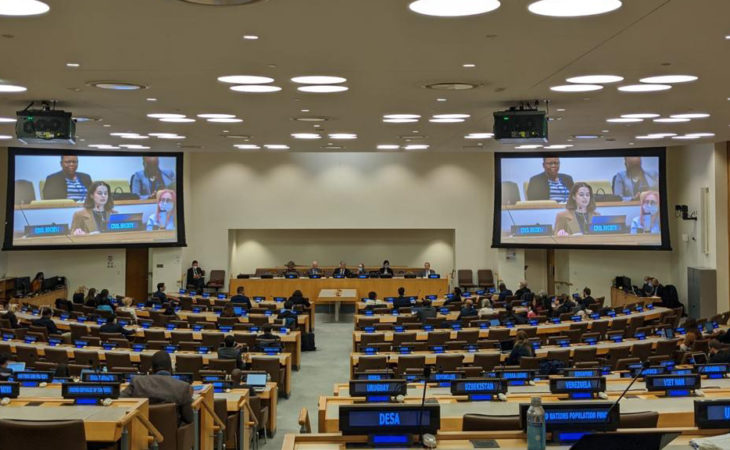Sex og Politikk taler for seksuelle rettigheter i FN

Sex og Politikk har deltatt på FNs befolkningskommisjon i New York og presenterte International Planned Parenthood Federations (IPPF) innlegg i generaldebatten.
Unges tilgang til seksualitetsundervisning, eliminering av seksuell og kjønnsbasert vold, og tilgang til seksuelle og reproduktive helsetjenester i humanitære kriser var blant hovedbudskapene.
Innlegget kan leses i sin helhet her:
Thank you, chair.
My name is Kristine Bjartnes and I am speaking on behalf of the International Planned Parenthood Federation, a leading advocate and service provider of sexual and reproductive health and rights. IPPF welcomes the 55th session of the CPD’s special theme and the opportunity to address the Commission.
This year’s theme presents an opportunity to integrate population in development strategies and to address the interlinkages between population, sustained inclusive economic growth and poverty. Gender equality, human rights and in particular SRHR has profound implications for social development, as well as sustained and inclusive economic growth. At individual, household, societal and macro levels, access to and fulfillment of human rights and fundamental freedoms, in particular SRHR, enables all people, particularly women and girls, to participate in social life, to access education and to participate in a sustainable, fair and equal access to the economy.
Education, including comprehensive sexuality education, is widely recognized as a powerful tool to empower women and girls within the family and society and is considered a key pathway to employment. Educated women are more likely to marry later, use family planning and access healthcare and understand their rights. We regret that comprehensive sexuality education has not been included in the outcome resolution this year, and hope to see it adequately reflected in next year’s theme which will focus on population, education and sustainable development.
On the other hand, women face added vulnerabilities and multiple and intersecting forms of discrimination depending on where they work in the economy, which can lead to a gendered gap in productivity and earnings. Unpaid care work increases the burden and exacerbate already existing inequalities in women’s share of care-giving, as well as the time, health and economic consequences that result from unplanned and/or frequent pregnancies, such as unsafe abortions, pregnancy complications, and increased rates of maternal and infant mortality.
In addition, humanitarian crises as well as the impacts of the Covid-pandemic continue to affect many of the world’s poorest countries, leaving the most marginalized communities behind. Humanitarian, health and climate crises have devastating impacts on the most vulnerable and marginalized groups, while exacerbating inequalities, both within and between countries. In this regard, universal social protection services including SRH services must be an integral part of short- and long-term government planning and recovery processes. SRHR is critical for advancing gender equality, health, and well‑being and for overcoming marginalisation and thus for strengthening individuals’ and communities’ resilience and capacity to adapt to environmental ills including the climate crisis.
In line with the above points, IPPF recommends governments to:
- Ensure implementation of Comprehensive Sexuality Education (CSE) programmes, as well as enforce legislation that addresses and eliminates sexual and gender-based violence (SGBV), including early and forced marriage and female genital mutilation, to ensure and promote girl’s right to education.
- Include SRHR in regulatory frameworks that support women’s access to decent work, as well as implement policies that shift and redistribute the burden of unpaid care work from women.
- Recognize, reduce and redistribute the burden of care work to ensure women’s economic empowerment, and the health and well-being of women and their families.
- Prioritize sustainable, resilient, and inclusive growth through the implementation of gender-responsive policies and budgeting, which will help to mitigate the short-term impacts, while also addressing long-term structural drivers of gender inequality.
- Integrate SRHR in policies, plans and programs aimed at ensuring climate adaptation and resilience to address the effects of climate change, and in the construction of climate resilient health systems, as well as by allocating the necessary funding.
Thank you.
